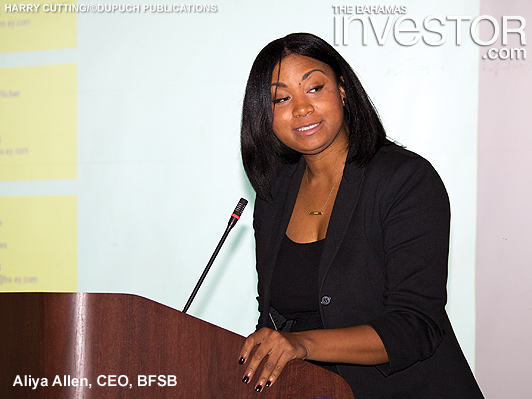| Published: Date: Updated: Author: |
The Bahamas Investor Magazine July 1, 2013 July 1, 2013 Steve Cotterill |
One of the major hindrances to development in wealth management is a lack of communication between policymakers and practitioners. Too often the public and private spheres operate independently, with scant regard to practical application or market demand. In financial services in The Bahamas, however, this gap has been bridged by the Bahamas Financial Services Board (BFSB), which comprises a profusion of industry leaders and is part funded by the government and part funded by members.
 Heading the organization is chief executive officer and managing director Aliya Allen and the current chairman is the managing director of ATC Trustees (Bahamas) Ltd, Paul Winder. In an exclusive question and answer session with The Bahamas Investor, the two industry leaders discussed the current challenges facing The Bahamas’ financial services sector and what efforts are being made to ensure its continued success.
Heading the organization is chief executive officer and managing director Aliya Allen and the current chairman is the managing director of ATC Trustees (Bahamas) Ltd, Paul Winder. In an exclusive question and answer session with The Bahamas Investor, the two industry leaders discussed the current challenges facing The Bahamas’ financial services sector and what efforts are being made to ensure its continued success.
Q: The sector has seen enormous upheaval during recent times. What is the current state of the financial services industry in The Bahamas?
Aliya Allen: We have reached a state of stability in the last year or so and the outlook is improving. I think that we are on the cusp of a very dynamic period for financial services. As a jurisdiction, we have a lot of advantages and we market these accordingly, such as political stability, legislation and expertise. More important is the fact that we are a well diversified centre, with a range of banking and trust offerings, legal, asset management and accounting capabilities, among others. When you look at other financial services centres that compete in the same space, you will find that they might have strengths in one area, but are lacking in other aspects.
Paul Winder: I agree that after several years of product and regulatory legislation we have reached a period of stability. However, there are things we still need to improve. Public administration does not move at the same speed as the private sector. It’s improving–the BFSB and the Attorney General are working hard to establish online services and e-government services–but it has not improved at a fast enough rate as yet.
Q: What other initiatives can we employ to improve the industry?
PW: We need further investment in training in both the private and public sectors. People can become qualified in accountancy, in law, investment or wealth management, but we also need to develop the softer skills. Customer service in the hotel industry is a massive part of the training budget, but in financial services there is more investment in theory.
AA: There is a lot of focus on technical issues but there should also be more focus on softer factors, such as how to talk to clients, how to win business, what is important to them and what are they expecting from their advisors. The BFSB is in the process of launching a programme that focuses on such factors, particularly when dealing with high-net-worth individuals (HNWIs). We are looking to employ the services of an international consulting firm to help us develop the programme.
We are also looking to enhance our language skill set, launching a programme last year with the largest online language learning website–livemocha.com. Nearly 200 financial services professionals from the public and private sectors have participated, studying Portuguese, Spanish and French, among others.
Q: Which specific markets is The Bahamas targeting this year?
AA: Of course we are looking at Latin America, because of the enormous opportunity and rapid development in that region. We are focusing on Brazil and we are solidifying the relationship and preparing to win more business, especially now that we have IOSCO Signatory A status. Other markets we are looking at in the region include Mexico, which we will visit this year. The suite of products, and how they work together, offer a very complete and sophisticated package for Latin American clients.
Q: With the march toward globalization ever ongoing, how has the investment culture changed in recent years?
PW: The business that The Bahamas is attracting is high end. We are mainly dealing with multinational families, with cross-jurisdictional interests, so no one product fits. When you sit down and review their needs on a case-by-case basis, they will have properties in different jurisdictions, children going to school in different jurisdictions; they will have a plane, a boat, properties in Florida, properties here and so on. When you get into that type of planning there is no one size fits all solution and you have to look at cross-border planning. The Bahamas has a lot versatility to be able to work with other jurisdictions. Many HNWIs will go to the various hubs for legal advice, so they will be in London, New York, Miami and they are dealing with the big law firms who come to us and say: “We are going to put this structure together and we feel that you can do this, but we are going to go somewhere else for another part.”
Moreover, families now have a greater number of advisors who are not looking for a quick fix solution, but are concentrating on dynastic planning, as opposed to just legacy planning. The Chinese for example prefer to create a dynasty rather than leave a legacy and that’s where I am seeing a different level of enquiry.
Q: What marketing efforts are being made to promote The Bahamas and how can we improve them?
AA: The way we structure the Bahamas Landfall promotional events is quite innovative and creative, but the key element is that we put aside the interests of individual firms and work together as a jurisdiction. Our delegations have representatives from all areas of the financial services industry, but the message is The Bahamas first.
PW: We need to continue with these targeted events and we need to utilize some of our Bahamian public sector resources–the consular offices and embassies. When we are planning an event, we need to speak to them and pull on their resources.
AA: We should do more to tap into the network of Bahamians that are working internationally. The reason we haven’t so far is because we don’t have the information. Other jurisdictions, such as Jamaica, know more about where their citizens are and what they are doing. We have not been as adept at collating that information. We are educated and ambitious and we need to utilize the connections that Bahamians are building around the world.
Q: What differentiates The Bahamas from competing financial centres?
PW: I don’t think we fit into a little square box. Our advantage is our versatility. As a sovereign nation, we are nimble and can make changes.
That is what differentiates us. We are a strong trust jurisdiction; we are a strong shipping jurisdiction; a strong corporate services provider. The advantage, as a practitioner, is that we don’t put all our eggs in one basket.
AA: I think The Bahamas has a very clear brand. We are a well-diversified jurisdiction and that is our advantage. We have real depth in products and services.
PW: We are also innovative. If you look at the last decade we have followed suit with regulation, but we have also been innovative: foundation legislation, SMART funds, The Bahamas Executive Entity. These are huge innovations that happened in a relatively short space of time. Bigger jurisdictions have bigger marketing budgets, but while they have been shouting about it, we have been quietly putting our house in order.
Q: A global shift to greater compliance has been pervasive during the last few years. How do you see this trend developing?
AA: International compliance standards are evolving and that is the new reality. But we have marketed ourselves on the basis that we have strong legislation, robust regulation and that we are compliant with international best practices. We should look at the evolution as an opportunity for The Bahamas, not just as a challenge.
PW: All practitioners understand that it is a time of change and have embraced compliance as part and parcel of their working day. There is no point in complaining about it; we have to deal with it. In fact, for practitioners, it presents greater opportunities and if you really know your client (KYC), then life just gets a lot easier.
Q: This year, The Bahamas celebrates 40 years of independence. How has the financial services sector contributed to the development of
the nation?
AA: If you are measuring the development of a nation by economic and social advancement, then no other sector has contributed as much to the development of the country since independence as financial services. Particularly in terms of developing a sophisticated, educated professional class in a sector that offers high paying jobs.
PW: Bahamians are now becoming internationally recognized. Wherever you go these days you get Bahamian practitioners who are considered authorities in the financial services industry. The sector is really helping Bahamians make a mark internationally.
Q: Looking forward, what developments would you hope to see happen during the next five, 10 years?
AA: Looking forward, I would want to see financial services contribute even more to The Bahamas and continue to grow. I would like The Bahamas to be openly acknowledged as the best financial centre in the region–because it is. I would hope that in the coming years it would not be absurd to think of financial services surpassing tourism in terms of its contribution to the nation’s gross domestic product (GDP) though that is a longer term goal.
PW: It may be a little contentious, but I would hope that in the next five to 10 years we have an international legal fraternity in The Bahamas. However, we have to think carefully about how we go about it and look at where we lack capacity, rather than simply throwing the doors open. We need expertise in certain areas to come in and enable businesses to work more efficiently, delivering technical expertise. I don’t think there will be full liberalization, but we could encourage certain people with certain skills to come in and help Bahamian businesses. It won’t be easy, but I can see there is already the beginning of a change in the mindset of policymakers.










